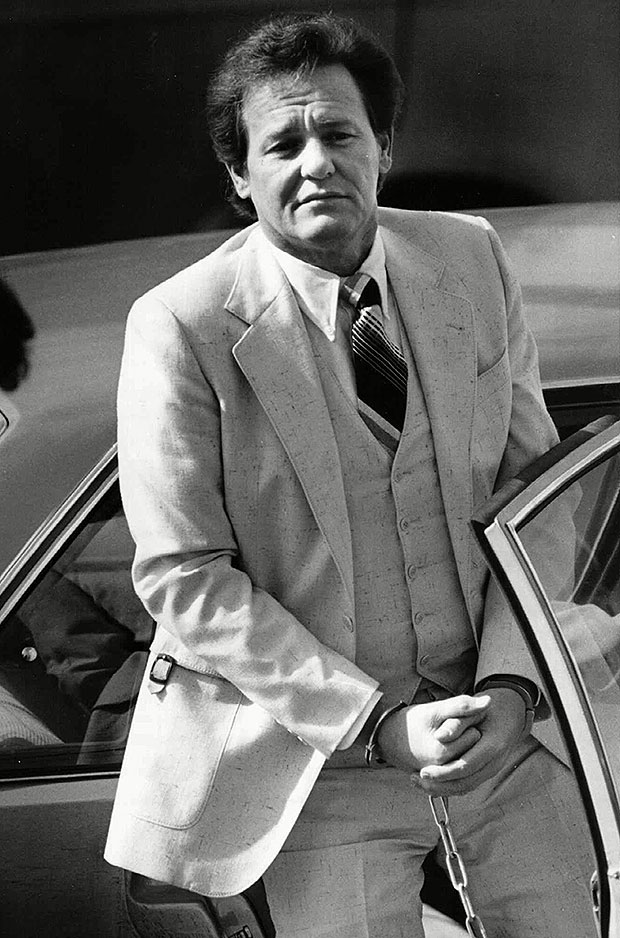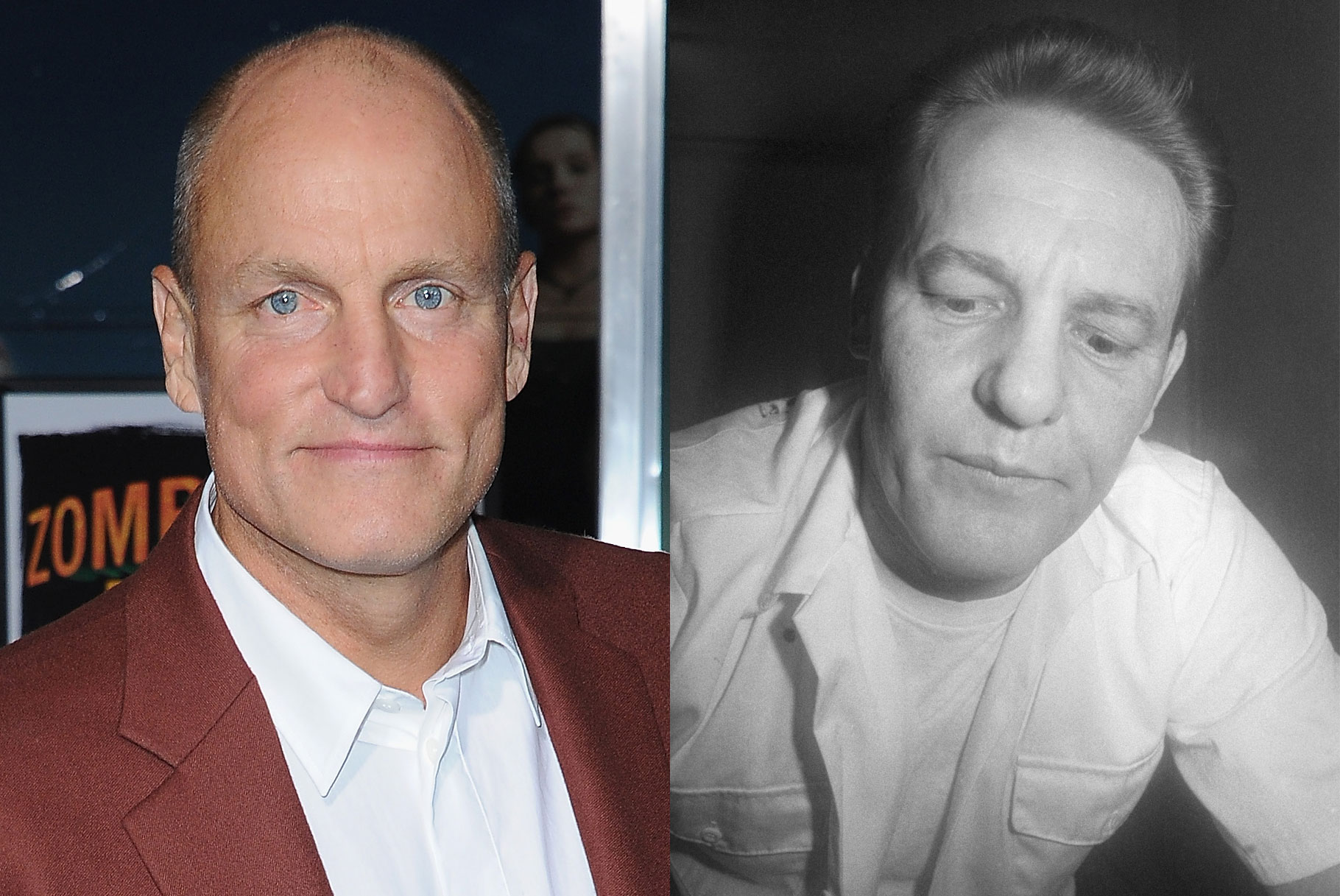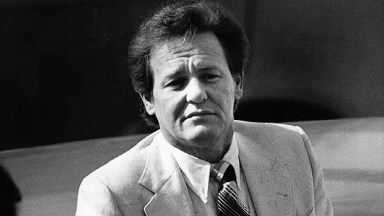The Shadow Of A Hitman: Unpacking Woody Harrelson's Dad's Legacy
The acclaimed actor Woody Harrelson is known globally for his versatile performances, from the endearing bartender Woody Boyd in "Cheers" to his gritty roles in "True Detective" and "No Country for Old Men." Yet, beneath the surface of his successful career lies a deeply complex and often dark personal history, largely shaped by the infamous life of his father. The story of Woody Harrelson's dad, Charles Harrelson, is not just a footnote in the actor's biography; it's a chilling narrative of crime, disappearance, and a legacy that continues to intrigue and haunt.
This article delves into the life of Charles Harrelson, exploring his journey from an ordinary salesman to a convicted hitman, and examines the profound impact his actions had on his son, Woody. We will uncover the details of his criminal career, the shocking assassination of a federal judge, and how these events reverberated through the life of one of Hollywood's most beloved stars, offering a unique perspective on family, fate, and the long shadow of the past.
Table of Contents
- Understanding Woody Harrelson: A Brief Biography
- The Enigmatic Figure: Who Was Charles Harrelson?
- The Disappearance and Its Impact on Young Woody
- Charles Harrelson's Descent into Infamy: The Path to Crime
- The Assassination of Judge John Wood: A Turning Point
- The Trial and Conviction of Woody Harrelson's Dad
- The Lingering Shadow: How Charles Harrelson's Legacy Shaped Woody
- Beyond the Headlines: The Complexities of Family and Fate
Understanding Woody Harrelson: A Brief Biography
Before delving into the life of his notorious father, it's essential to understand the man who would become Woody Harrelson. Born Woodrow Tracy Harrelson on July 23, 1961, in Midland, Texas, Woody's journey to stardom was anything but conventional. His early life was marked by a challenging family dynamic, which would later be revealed to be far more complex than he initially understood.
Woody Harrelson's career began to take off in the mid-1980s when he landed the role of Woody Boyd on the immensely popular sitcom "Cheers." This role, which earned him an Emmy Award, established him as a comedic talent. However, Harrelson soon transitioned to more dramatic and diverse roles in films like "Natural Born Killers," "The People vs. Larry Flynt," "No Country for Old Men," and "Three Billboards Outside Ebbing, Missouri," showcasing his incredible range and earning him multiple Academy Award nominations.
Early Life and Family Background
Woody was the second son born to Diane Harrelson (née Oswald), a devoutly religious legal secretary, and Charles Harrelson. The stark contrast between his parents' personalities and lifestyles would become a recurring theme in his life, particularly as the true nature of his father's activities came to light. According to Woody, his father disappeared from the family's home in Houston in 1968, leaving a void that would be filled with questions and, eventually, shocking revelations.
| Attribute | Detail |
|---|---|
| Full Name | Woodrow Tracy Harrelson |
| Date of Birth | July 23, 1961 |
| Place of Birth | Midland, Texas, USA |
| Parents | Charles Harrelson (Father), Diane Harrelson (Mother) |
| Occupation | Actor, Activist |
| Notable Roles | Cheers, Natural Born Killers, No Country for Old Men, True Detective, Three Billboards Outside Ebbing, Missouri |
The Enigmatic Figure: Who Was Charles Harrelson?
The man at the center of this complex narrative is Charles Harrelson, Woody Harrelson's dad. Born on July 23, 1938, in Lovelady, Texas, Charles's early life offered little indication of the dark path he would eventually take. His existence, for a time, seemed to mirror that of many ordinary Americans, striving to make a living.
- Lsu South Carolina Baseball
- City Of Houston Water
- North American Mastiff
- Trump Rally Today
- Kanye Heil Hitler Song X
Early Life and Shifting Professions
In his earlier life, Charles Harrelson worked as an encyclopedia salesman, a seemingly innocuous profession that involved door-to-door interactions and persuasive sales pitches. This role required a certain charm and ability to connect with people, traits that could be easily twisted for more nefarious purposes later on. Alongside this, he also engaged in professional gambling, an occupation that often exists on the fringes of legality and requires a keen mind for risk and strategy. These early careers, while distinct, hint at a personality that was perhaps drawn to excitement, quick money, and a life outside the conventional.
The transition from these professions to the world of serious crime is a stark one, marking a significant turning point in Charles Harrelson's life. It suggests a gradual escalation, a deepening involvement in illicit activities that would ultimately lead him to achieve infamy in an entirely different and tragic way.
The Disappearance and Its Impact on Young Woody
For Woody Harrelson, his father's presence was fleeting. Charles Harrelson disappeared from the family's home in Houston in 1968, when Woody was just seven years old. This sudden departure left a profound void in the young boy's life, shaping his understanding of family and absence. For years, the full truth of his father's activities remained hidden from Woody, leaving him to piece together a fragmented narrative based on what little information he had.
The impact of a parent's unexplained disappearance on a child is immense, often leading to feelings of abandonment, confusion, and a persistent yearning for answers. For Woody, this absence was compounded by the fact that his mother, Diane, and Charles Harrelson were "practically polar opposites." While Diane was a devoutly religious legal secretary, Charles was moving towards a life of crime. This fundamental difference in their characters and paths likely created an already strained family environment even before Charles vanished.
The lack of a consistent paternal figure, coupled with the eventual revelation of his father's criminal enterprises, would undoubtedly influence Woody's worldview and his later artistic choices, imbuing his performances with a depth and complexity that perhaps only someone with such a unique personal history could convey.
Charles Harrelson's Descent into Infamy: The Path to Crime
The path that Charles Harrelson took from a salesman and gambler to a convicted murderer is a chilling chronicle of escalating criminal activity. His initial brushes with the law were likely less severe, but over time, his involvement in the underworld deepened, leading him down a dark and irreversible road. This progression paints a picture of a man who became increasingly entrenched in a life of violence and illicit gain, culminating in an act that would forever define his legacy and cast a long shadow over his family.
From Armed Robber to Professional Triggerman
As The Guardian recapped in a 2012 profile of Woody, the actor’s father, Charles V. Harrelson, progressed significantly in his criminal career. He moved from being an armed robber to becoming a professional triggerman in the years that followed his disappearance from Woody's life. This shift indicates a deliberate choice to engage in more dangerous and direct acts of violence for financial gain. A "triggerman" is someone hired to commit murder, a role that signifies a complete immersion into the most brutal aspects of organized crime.
When all was said and done, Charles Harrelson was rumored to have been behind several killings, solidifying his reputation as a ruthless and effective hitman. This reputation, built on violence and fear, would eventually lead him to the most infamous act of his life: the assassination of a federal judge. The journey of Woody Harrelson's dad from a seemingly ordinary man to a notorious contract killer is a stark reminder of the dark underbelly of society and the profound impact such a life can have on those connected to it.
The Assassination of Judge John Wood: A Turning Point
The crime that cemented Charles Harrelson's place in infamy was the assassination of U.S. District Judge John Wood Jr. On May 29, 1979, Judge Wood was tragically shot outside his San Antonio, Texas, home as he bent down to look at something. This act was not a random crime of passion but a calculated hit, ordered by drug trafficker Jimmy Chagra, who was facing trial before Judge Wood. The judge, known as "Maximum John" for his tough sentencing, was a high-profile target, and his murder sent shockwaves through the American legal system.
The murder of a federal judge was an unprecedented event in the 20th century, highlighting the dangerous reach of organized crime and the lengths to which criminals would go to evade justice. The investigation into Judge Wood's death was extensive, eventually leading authorities to Charles Harrelson. His reputation as a professional triggerman made him a prime suspect, and the evidence gathered pointed squarely to his involvement in this heinous crime. This event would not only seal Charles's fate but also dramatically alter the public perception and understanding of Woody Harrelson's dad.
The assassination underscored the extreme risks faced by those upholding the law and brought a harsh spotlight onto the world of contract killings. For the Harrelson family, particularly Woody, this event would serve as the horrifying revelation of his father's true nature, a truth far more disturbing than any previous assumptions about his disappearance.
The Trial and Conviction of Woody Harrelson's Dad
The trial of Charles Harrelson for the murder of Judge John Wood was a high-profile event, drawing national attention due to the unprecedented nature of the crime. The prosecution presented a compelling case, detailing Harrelson's role as the hitman hired by Jimmy Chagra. Despite his claims of innocence and attempts to implicate others, the evidence against him was substantial.
On December 14, 1982, Charles Harrelson, father of actor Woody Harrelson, was convicted of murdering Judge John Wood. This conviction marked the culmination of years of criminal activity for Charles, finally bringing him to justice for his most egregious act. He was sentenced to two life terms plus 15 years, ensuring that he would spend the remainder of his life behind bars. The conviction of Woody Harrelson's dad was a definitive moment, closing a dark chapter in American legal history while simultaneously opening a new, challenging one for his son.
Charles Harrelson maintained his innocence regarding the Judge Wood murder throughout his incarceration, even claiming at one point to have been involved in the assassination of President John F. Kennedy, though this claim was widely dismissed as a desperate attempt for attention. He died in federal prison in 2007, still incarcerated for the murder of Judge Wood. His death closed the book on a life defined by crime, but the ripple effects of his actions continued to influence those he left behind, most notably his famous son.
The Lingering Shadow: How Charles Harrelson's Legacy Shaped Woody
The revelation of his father's true identity and criminal past was a monumental shock for Woody Harrelson. It wasn't something he grew up knowing; rather, it was a truth that unfolded publicly and dramatically. This exposure to his father's dark legacy undoubtedly had a profound impact on Woody, influencing his personal philosophy, his views on justice, and even aspects of his public persona. The shadow cast by Charles Harrelson's actions is long, and understanding its influence is key to appreciating the actor's journey.
Woody's Awareness and Public Acknowledgment
Woody — born Woodrow Harrison in Midland, Texas — apparently wasn’t aware of his father’s troubled past until he was listening to the radio one day. This sudden, public discovery of his father's infamy must have been a jarring experience, transforming a vague absence into a concrete, horrifying reality. Imagine hearing on the news that your estranged father is a convicted hitman, responsible for the murder of a federal judge. This moment would forever alter Woody's perception of his family history and his own identity.
Despite the notoriety, Woody Harrelson maintained a complex relationship with his father, even visiting him in prison. These visits and their conversations reveal a son grappling with the difficult truth of his parent's life, seeking to understand the man behind the headlines. Woody has spoken publicly about his father, acknowledging his past but also expressing a desire for connection and understanding, highlighting the deep-seated human need to reconcile with one's origins, no matter how troubled. The story of Woody Harrelson's dad is a testament to the enduring complexities of familial bonds, even in the face of unspeakable acts.
Beyond the Headlines: The Complexities of Family and Fate
The narrative of Woody Harrelson and his father, Charles Harrelson, is more than just a sensational crime story; it's a poignant exploration of how individual choices can ripple through generations, shaping lives in unexpected ways. For Woody, his father's life of crime and subsequent incarceration meant growing up without a consistent paternal presence, only to later discover the horrifying truth about the man who was his biological parent. This unique personal history undoubtedly contributed to the depth and intensity he brings to his acting roles, often portraying characters with complex moral compasses or troubled pasts.
The stark contrast between Charles Harrelson's life of violence and Woody's rise to global stardom, advocating for peace and environmental causes, offers a compelling study in human resilience and the ability to forge one's own path despite challenging origins. It raises questions about nature versus nurture, the impact of early childhood experiences, and the choices individuals make that define their destinies. The story of Woody Harrelson's dad serves as a powerful reminder that even in the darkest corners of human experience, there are layers of complexity, pain, and, ultimately, the enduring human spirit striving for understanding and connection.
This saga is a testament to the fact that while we cannot choose our family, we can choose how we respond to their legacies. Woody Harrelson has navigated this incredibly difficult personal history with a remarkable degree of candor and resilience, turning what could have been a debilitating burden into a source of unique perspective and empathy.
Conclusion
The life of Charles Harrelson, Woody Harrelson's dad, is a dark and compelling chapter in American criminal history, marked by his progression from a seemingly ordinary salesman to a convicted hitman responsible for the unprecedented assassination of a federal judge. His disappearance from Woody's life in 1968, followed by the shocking public revelation of his criminal deeds, cast a long and complex shadow over the actor's upbringing and public persona. Woody Harrelson's journey, from a child grappling with an absent father to a globally recognized star, is inextricably linked to this turbulent family history, showcasing remarkable resilience in the face of profound personal challenges.
This exploration into the life of Charles Harrelson not only sheds light on a notorious criminal but also offers a deeper understanding of the acclaimed actor Woody Harrelson, whose artistic depth may well be informed by the unique complexities of his past. We hope this article has provided valuable insights into this intriguing and often tragic family narrative. What are your thoughts on how personal history, particularly one as dramatic as Woody Harrelson's, shapes an individual's life and career? Share your reflections in the comments below, or explore our other articles for more fascinating insights into the lives behind the headlines.



Detail Author:
- Name : Mr. Roger Turcotte
- Username : evie77
- Email : janie72@yahoo.com
- Birthdate : 2006-12-11
- Address : 8594 Donavon Landing Casperborough, AR 07633
- Phone : (831) 885-7811
- Company : Smitham, Volkman and Schamberger
- Job : Fire Fighter
- Bio : Et eveniet fugiat rerum dignissimos. Fuga perspiciatis libero harum maiores. Ut repudiandae adipisci quod ut sit nulla.
Socials
twitter:
- url : https://twitter.com/bernierj
- username : bernierj
- bio : Alias unde ut voluptatem voluptas. Modi fugit ex pariatur cum. Aut culpa ipsam illo explicabo amet.
- followers : 1817
- following : 2136
tiktok:
- url : https://tiktok.com/@jamil37
- username : jamil37
- bio : Ducimus velit nemo placeat officia sapiente quibusdam.
- followers : 4458
- following : 358